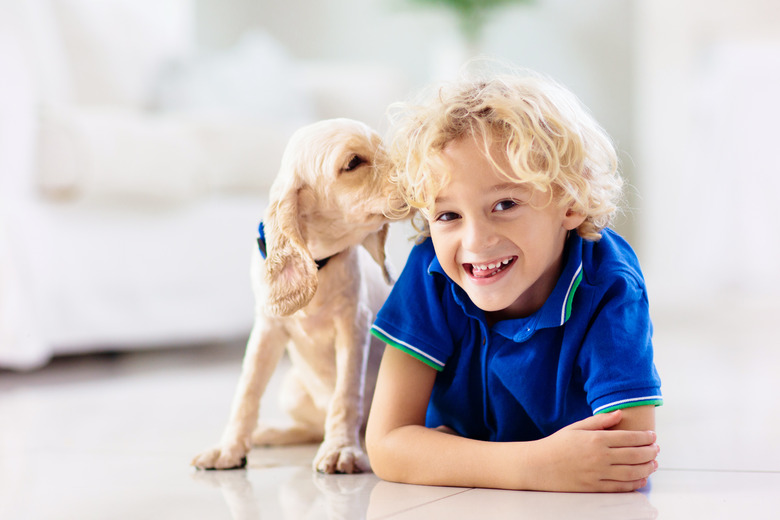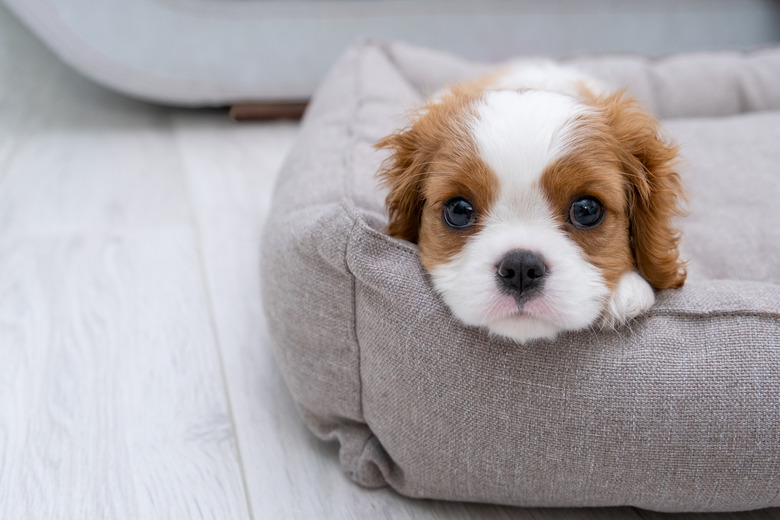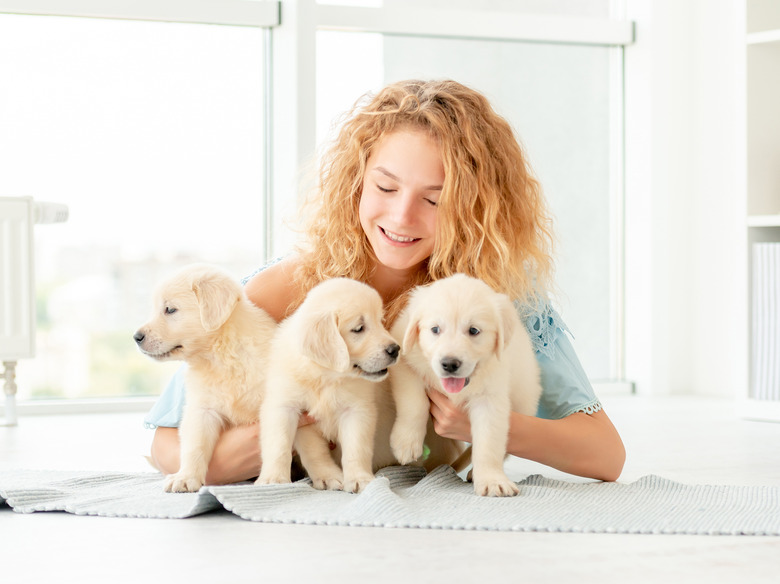How To Treat A Puppy With An Overactive Bladder
How to Treat a Puppy With an Overactive Bladder
We spoke with Dr. Ingrid Taylor, a veterinarian with 16 years of experience in general clinical and emergency practice and public health, to learn more about puppies that have an overactive bladder. While puppies will need to urinate more frequently than adult dogs, some puppies have an overactive bladder, also referred to as urinary incontinence. "Puppies with an overactive bladder not only urinate more than other puppies, but also at inappropriate times," says Dr. Taylor. "They may have accidents while sleeping or the puppy may appear to have no control over it."
Signs of a puppy with urinary incontinence include urinating inside the home (even after they have learned to go outside); straining or painful urination; frequent urination; dribbling, leaking, or dripping urine; or frequent licking of the genital area. When these signs are present, it's important to take your dog to the veterinarian for a physical examination to rule out medical issues like a UTI.
An overactive bladder can happen in both male dogs and female dogs. In some cases, this may happen after spaying a puppy, particularly if the puppy is spayed at an extremely young age. This is called "spay incontinence" because it appears in some female dogs after they have been spayed. The cause of incontinence in these patients is most likely related to decreased estrogen levels associated with removing the ovaries during the spay.
Basic potty training for puppies
Basic potty training for puppies
Accidents are common during potty training and don't automatically mean your puppy has a medical problem. Puppies who are 4 months of age and younger typically have limited bladder control and reflexes and need to be house trained. When house training a puppy, it's important to take them outside frequently and provide positive reinforcement when they potty outside. "It is easier to house train a puppy if you keep them on a regular feeding and bathroom schedule," says Dr. Taylor.
Young puppies need to be supervised when they are loose in the house; crate training can help prevent accidents in the early days of house training. Many times, when puppies are loose and feel the urge to go, they will give an indication that they have to potty, but without supervision, this can easily be missed. If a puppy begins circling, looks anxious or nervous, or goes to squat, quickly move them outdoors and praise them when they potty outside.
If your puppy has an accident
If your puppy has an accident
It is normal for puppies to have accidents during the house training process. However, you should not correct them since the puppy won't understand what they did wrong after the fact. Water intake should never be restricted. "It is up to you to take your puppy or your senior dogs out often enough so that they don't end up having accidents in the house," says Dr. Taylor. "This may mean frequent visits outside in the early stages of house training."
Also, if your puppy has a medical condition, you should not correct them because they do not have the ability to control their urine. If your puppy has a medical condition, it's up to you to make sure they get outside enough to avoid accidents while the condition is diagnosed and a treatment plan is made.
Medical conditions that cause an overactive bladder in puppies
Medical conditions that cause an overactive bladder in puppies
If your puppy seems to be having a problem controlling their urine beyond what one would typically see with normal puppy house training, there may be a medical condition or birth defect.
Signs that you may be dealing with a medical condition include dribbling or leaking urine, frequent licking of the genital area, a rash on the belly or genital area, urination or a urine stream that seems incomplete, straining to urinate, blood in the urine, or urinating frequently in small amounts (though this may be difficult to distinguish from normal puppy behavior).
Some causes of urinary incontinence in puppies include a urinary tract infection, bladder stones, or bladder infections. Other medical conditions or abnormalities that can cause an overactive bladder in puppies include kidney disease or kidney failure, neurological and spinal cord defects, metabolic and endocrine disorders, and ectopic ureters.
Certain conditions, such as minor infections, can be quickly cleared up with antibiotics with minimal risk of side effects. In some cases, medications like phenylpropanolamine can be used to control the issue if the cause of urinary incontinence is related to a weak bladder sphincter. "If ectopic ureters are diagnosed, this requires surgery to correct," says Dr. Taylor. "Your veterinarian will likely take a urine sample to do a urinalysis and run some blood tests to help diagnose the problem. In some cases, your veterinarian may also require X-rays, an ultrasound, or other tests to find the underlying cause."
Behavioral conditions that cause an overactive bladder in puppies
Behavioral conditions that cause an overactive bladder in puppies
If your veterinarian does not find any problems and your puppy is still urinating frequently, review any changes in diet and emotional triggers that could be contributing to the increased urination. Sometimes, a change in routine, the addition of a new pet or family member, or moving to a new home can cause a puppy to change their bathroom habits.
It may simply be that you are not bringing your puppy outside often enough. Create a schedule that allows the puppy to go outside to do their bathroom business on a regular basis. Increased outdoor trips could reduce the number of indoor accidents. Consistency is important when working with house training issues in puppies, so try to maintain a regular schedule.
The bottom line
The bottom line
It is normal for puppies to have accidents during the house training process, but if your puppy has an overactive bladder, or urinary incontinence, you may need to see your DVM to rule out medical issues. Possible signs of medical issues include leaking urine while sleeping, frequent licking of the genital area, straining to urinate, blood in the urine, or urinating frequently in small amounts. Your veterinarian can run tests to rule out such conditions as bladder infections, neurological and spinal defects, bladder stones, metabolic and endocrine disorders, and ectopic ureters and will address any medical issues.


